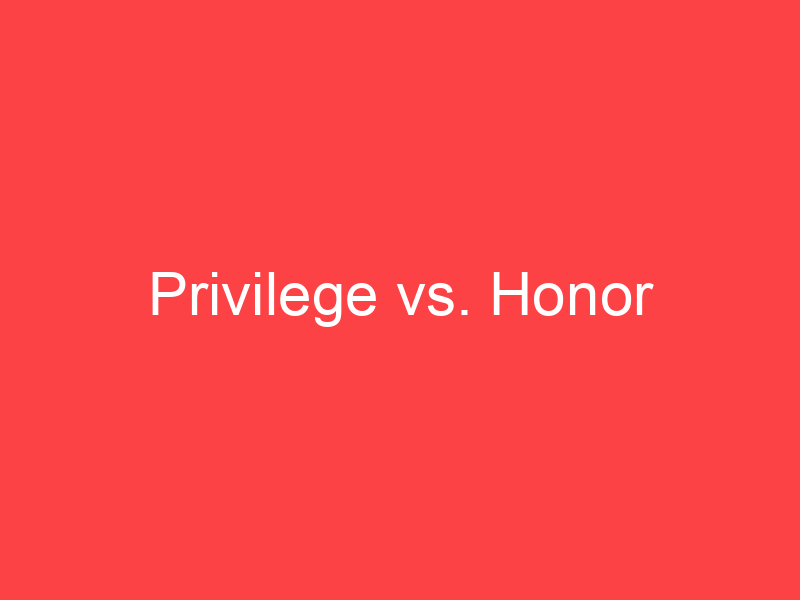-
Privilege (noun)
An exemption from certain laws granted by the Pope. from 8th c.
-
Privilege (noun)
A particular benefit, advantage, or favor; a right or immunity enjoyed by some but not others; a prerogative, preferential treatment. from 10th c.
“All first-year professors here must teach four courses a term, yet you’re only teaching one! What entitled you to such a privilege?”
-
Privilege (noun)
An especially rare or fortunate opportunity; the good fortune (to do something). from 14th c.
-
Privilege (noun)
The fact of being privileged; the status or existence of (now especially social or economic) benefit or advantage within a given society. from 14th c.
-
Privilege (noun)
A right or immunity enjoyed by a legislative body or its members. from 16th c.
-
Privilege (noun)
A stock market option. from 19th c.
-
Privilege (noun)
A common law doctrine that protects certain communications from being used as evidence in court.
“”Your honor, my client is not required to answer that; her response is protected by attorney-client privilege.”
-
Privilege (noun)
An ability to perform an action on the system that can be selectively denied to users; permission.
-
Privilege (verb)
To grant some particular right or exemption to; to invest with a peculiar right or immunity; to authorize
“to privilege representatives from arrest”
-
Privilege (verb)
To bring or put into a condition of privilege or exemption from evil or danger; to exempt; to deliver.
-
Honor (noun)
recognition of importance or value; respect; veneration of someone, usually for being morally upright and/or competent
“The crowds gave the returning general much honor and praise.”
-
Honor (noun)
the state of being morally upright, honest, noble, virtuous, and magnanimous; excellence of character; the perception of such a state; favourable reputation; dignity
“He was a most perfect knight, for he had great honor and chivalry.”
“His honor was unstained.”
-
Honor (noun)
a token of praise or respect; something that represents praiseworthiness or respect, such as a prize or award given by the state to a citizen
“Honors are normally awarded twice a year: on The Queen’s Birthday in June and at the New Year.”
“He wore an honor on his breast.”
“military honors; civil honors”
“Audie Murphy received many honors, such as the Distinguished Service Cross.”
-
Honor (noun)
a privilege
“I had the honour of dining with the ambassador.”
-
Honor (noun)
the privilege of going first
“I’ll let you have the honours, Bob—go ahead.”
-
Honor (noun)
a cause of respect and fame; a glory; an excellency; an ornament.
“He is an honour to his nation.”
-
Honor (noun)
a seigniory or lordship held of the king, on which other lordships and manors depended
-
Honor (noun)
the center point of the upper half of an armorial escutcheon honour point}}
-
Honor (noun)
In bridge, an ace, king, queen, jack, or ten especially of the trump suit. In some other games, an ace, king, queen or jack.
-
Honor (noun)
(courses for) an honours degree: a university qualification of the highest rank
“At university I took honours in modern history.”
-
Honor (verb)
to think of highly, to respect highly; to show respect for; to recognise the importance or spiritual value of
“The freedom fighters will be forever remembered and honored by the people.”
-
Honor (verb)
to conform to, abide by, act in accordance with (an agreement, treaty, promise, request, or the like)
“I trusted you, but you have not honored your promise.”
“refuse to honor the test ban treaty”
-
Honor (verb)
to confer (bestow) an honour or privilege upon (someone)
“Ten members of the profession were honored at the ceremony.”
“The prince honored me with an invitation to his birthday banquet.”
-
Honor (verb)
to make payment in respect of (a cheque, banker’s draft, etc.)
“I’m sorry Sir, but the bank did not honour your cheque.”
-
Privilege (noun)
a special right, advantage, or immunity granted or available only to a particular person or group
“education is a right, not a privilege”
“he has been accustomed all his life to wealth and privilege”
-
Privilege (noun)
something regarded as a special honour
“I had the privilege of giving the Sir George Brown memorial lecture”
-
Privilege (noun)
(especially in a parliamentary context) the right to say or write something without the risk of incurring punishment or legal action for defamation
“a breach of parliamentary privilege”
“he called on MPs not to abuse their privilege”
-
Privilege (noun)
the right of a lawyer or official to refuse to divulge confidential information.
-
Privilege (noun)
a grant to an individual, corporation, or place of special rights or immunities, especially in the form of a franchise or monopoly.
-
Privilege (verb)
grant a privilege or privileges to
“English inheritance law privileged the eldest son”
-
Privilege (verb)
exempt (someone) from a liability or obligation to which others are subject
“barristers are privileged from arrest going to, coming from, and abiding in court”

